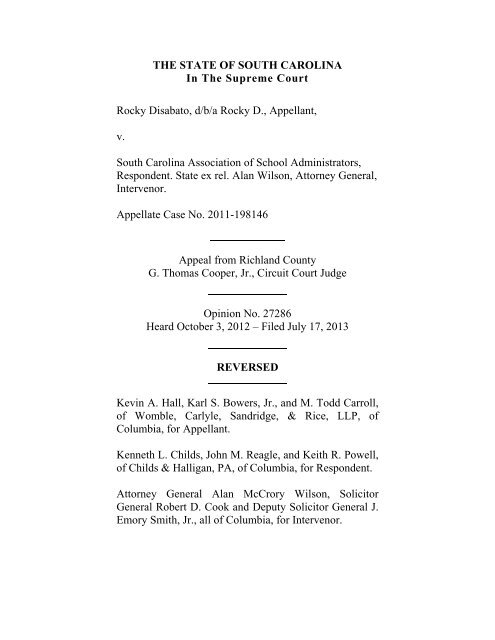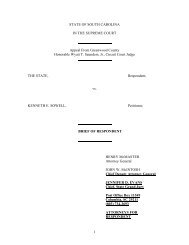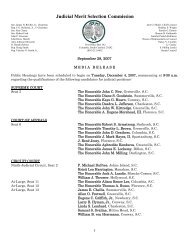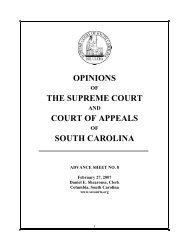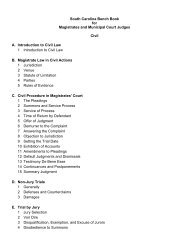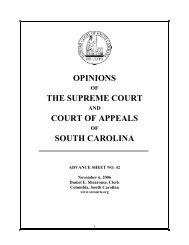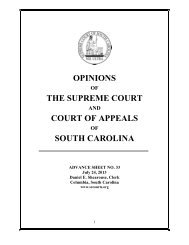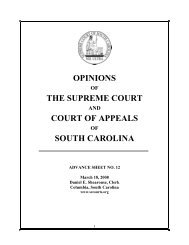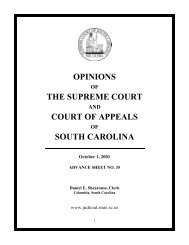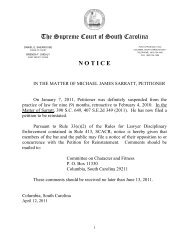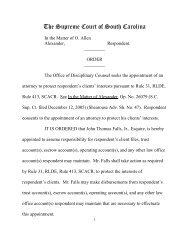27286 - Disabato v. SCASA - SC Judicial Department
27286 - Disabato v. SCASA - SC Judicial Department
27286 - Disabato v. SCASA - SC Judicial Department
Create successful ePaper yourself
Turn your PDF publications into a flip-book with our unique Google optimized e-Paper software.
THE STATE OF SOUTH CAROLINA In The Supreme Court Rocky <strong>Disabato</strong>, d/b/a Rocky D., Appellant,v.South Carolina Association of School Administrators,Respondent. State ex rel. Alan Wilson, Attorney General,Intervenor.Appellate Case No. 2011-198146Appeal from Richland CountyG. Thomas Cooper, Jr., Circuit Court JudgeOpinion No. <strong>27286</strong> Heard October 3, 2012 – Filed July 17, 2013 REVERSED Kevin A. Hall, Karl S. Bowers, Jr., and M. Todd Carroll,of Womble, Carlyle, Sandridge, & Rice, LLP, ofColumbia, for Appellant.Kenneth L. Childs, John M. Reagle, and Keith R. Powell,of Childs & Halligan, PA, of Columbia, for Respondent.Attorney General Alan McCrory Wilson, SolicitorGeneral Robert D. Cook and Deputy Solicitor General J.Emory Smith, Jr., all of Columbia, for Intervenor.
Scott Thomas Price, of Columbia, for Amicus Curiae,South Carolina School Boards Association.Jerald A. Jacobs, of Pillsbury Winthrop Shaw Pittman, LLP, ofWashington, DC, for Amicus Curiae, American Society ofAssociation Executives.Jerry Jay Bender, of Baker, Ravenel & Bender, LLP, ofColumbia, for Amicus Curiae, South Carolina PressAssociation and South Carolina BroadcastersAssociation.Marsha A. Ward, of Atlanta, GA, for Amicus Curiae,The Student Press Law Center and Reporters Committeefor Freedom of the Press in Support of Petitioner Rocky<strong>Disabato</strong>.JUSTICE HEARN: This case requires us to reconcile two competingprinciples of our democratic tradition. First, embodied in the South CarolinaFreedom of Information Act, Title 30, Chapter 4 of the South Carolina Code (theFOIA), is the principle of an open, transparent system of government, vital tomaintaining an informed electorate and preventing the secret exercise ofgovernmental power with its potential corruption. Juxtaposed against this principleare the rights of citizens to freely speak and associate embodied in the FirstAmendment to the United States Constitution. We must decide whether the FOIAas applied to the South Carolina Association of School Administrators (<strong><strong>SC</strong>ASA</strong>), anon-profit corporation engaged in political advocacy, unconstitutionally infringesupon <strong><strong>SC</strong>ASA</strong>'s First Amendment speech and association rights. We hold the FOIAdoes not violate those rights and reverse the circuit court's order granting <strong><strong>SC</strong>ASA</strong>'smotion to dismiss.FACTUAL/PROCEDURAL BACKGROUND<strong><strong>SC</strong>ASA</strong> is a non-profit, South Carolina corporation whose purpose is toadvocate on legislative and policy issues impacting education. In August of 2009,
Rocky <strong>Disabato</strong> sent <strong><strong>SC</strong>ASA</strong> a request for information pursuant to the FOIA. 1 TheExecutive Director of <strong><strong>SC</strong>ASA</strong> sent <strong>Disabato</strong> a response in which she refused toproduce any of the requested materials and asserted that <strong><strong>SC</strong>ASA</strong> is not a publicentity subject to the FOIA.Thereafter, <strong>Disabato</strong> filed a complaint in circuit court seeking a declarationthat <strong><strong>SC</strong>ASA</strong> violated the FOIA by refusing to comply with his request as well asan injunction requiring <strong><strong>SC</strong>ASA</strong> to comply with the FOIA. <strong><strong>SC</strong>ASA</strong> filed a motionto dismiss the action pursuant to Rule 12(b)(6), <strong>SC</strong>RCP, on the grounds that, whenthe FOIA is applied to a public body that is a non-profit corporation engaged inpolitical advocacy, the FOIA unconstitutionally violates the First Amendmentrights of speech and association. 2In ruling on the motion to dismiss, the circuit court assumed that <strong><strong>SC</strong>ASA</strong> issupported by public funds, is a public body subject to the FOIA, and is acorporation engaged in political speech and issue advocacy. The court first held1 <strong>Disabato</strong>'s letter stated in pertinent part:Pursuant to the South Carolina Freedom of Information Act, I herebyrequest that you provide me with a copy of all emails, letters, memos,documents, and other records possessed or maintained by the SouthCarolina Association of School Administrators that discuss both theAmerican Recovery and Reinvestment Act of 2009 and GovernorMark Sanford, including but not limited to any references to thelawsuit filed by your organization against Gov. Sanford in May 2009.I also request that you provide me with a copy of any record thatreflects all telephone calls made by or received by your organizationand its staff, including the staff members' cell phones, from January 1,2009 to July 31, 2009. Your response is due within fifteen days.2 <strong><strong>SC</strong>ASA</strong>'s brief asserts that it also moved to dismiss the complaint on the groundsthat application of the FOIA to <strong><strong>SC</strong>ASA</strong> violates Article 1, Section 2 of the SouthCarolina Constitution which provides for the "freedom of speech." S.C. Const. art.I, § 2 (1976). However, the record is devoid of any mention of Article 1, Section2, and therefore, the issue is not before us. See Wilder Corp. v. Wilke, 330 S.C. 71,76, 497 S.E.2d 731, 733 (1998) ("It is axiomatic that an issue cannot be raised forthe first time on appeal . . . .").
that the FOIA burdens <strong><strong>SC</strong>ASA</strong>'s First Amendment speech and association rights,and then reviewed the constitutionality of the FOIA using a combination of theexacting and strict scrutiny standards of review. In its order dismissing <strong>Disabato</strong>'scomplaint, the court stated that "[t]he FOIA's broad definition of 'public body' canonly be sustained as constitutional if the FOIA's open meeting and recordsdisclosure requirements are substantially related to a sufficiently importantgovernmental purpose and no less restrictive means of achieving this purposeexists." The court held the FOIA as applied to <strong><strong>SC</strong>ASA</strong> does not meet that standardbecause the disclosure and open meetings requirements are not substantiallyrelated to the purposes of the statute and because a less restrictive means ofachieving the statute's purposes exists. Accordingly, the court held the FOIAviolates <strong><strong>SC</strong>ASA</strong>'s First Amendment speech and association rights and granted themotion to dismiss. This appeal followed.ISSUES PRESENTEDI. Is <strong><strong>SC</strong>ASA</strong> a "public body" subject to the South Carolina Freedom ofInformation Act?II.Does application of the FOIA to <strong><strong>SC</strong>ASA</strong> violate <strong><strong>SC</strong>ASA</strong>'s First Amendmentspeech and association rights as incorporated through the FourteenthAmendment?STANDARD OF REVIEWA claim may be dismissed when the defendant demonstrates that the plaintiffhas failed to allege facts sufficient to establish a cause of action. Rule 12(b)(6),<strong>SC</strong>RCP. We review the grant of dismissal according to the same standard appliedby the circuit court. See Williams v. Condon, 347 S.C. 227, 233, 553 S.E.2d 496,500 (Ct. App. 2001). A ruling on a motion to dismiss pursuant to Rule 12(b)(6)must be based solely on the factual allegations set forth in the complaint, and thecourt must consider all well-pled allegations as true. Gressette v. S.C. Elec. & GasCo., 370 S.C. 377, 378–79, 635 S.E.2d 538, 538 (2006).The Supreme Court has a limited scope of review in consideringconstitutional challenges to statutes. Joytime Distribs. & Amusement Co. v. State,338 S.C. 634, 640, 528 S.E.2d 647, 650 (1999). The Court presumes that all
statutes are constitutional and will, if possible, construe a statute so as to render itconstitutional. Davis v. Cnty. of Greenville, 322 S.C. 73, 77, 470 S.E.2d 94, 96(1996).LAW/ANALYSISOur General Assembly enacted the FOIA based on the premise "that it isvital in a democratic society that public business be performed in an open andpublic manner so that citizens shall be advised of the performance of publicofficials and of the decisions that are reached in public activity and in theformulation of public policy." S.C. Code Ann. § 30-4-15 (2007). In furtherance ofthat purpose, the FOIA subjects a "public body" to record disclosure and openmeeting requirements.Among those entities defined as a public body subject to the statute are "anyorganization, corporation, or agency supported in whole or in part by public fundsor expending public funds . . . ." S.C. Code Ann. § 30-4-20(a). We held in Westonv. Carolina Research & Development Foundation, 303 S.C. 398, 401 S.E.2d 161(1991), that the statute's unambiguous language brings even a private corporationsupported by public funds within the definition of a public body. Id. at 403, 401S.E.2d at 164. We further clarified that holding, stating:this decision does not mean that the FOIA would apply to businessenterprises that receive payment from public bodies in return forsupplying specific goods or services on an arm[']s length basis. Inthat situation, there is an exchange of money for identifiable goods orservices and access to the public body's records would show how themoney was spent. However, when a block of public funds is diverteden masse from a public body to a related organization, or when therelated organization undertakes the management of the expenditure ofpublic funds, the only way that the public can determine withspecificity how those funds were spent is through access to therecords and affairs of the organization receiving and spending thefunds.Id. at 404, 401 S.E.2d at 165.The FOIA's record disclosure requirement provides that "any person has aright to inspect or copy any public record of a public body" subject to certain
exceptions. S.C. Code Ann. § 30-4-30(a). A public body must provide anyrequested records within fifteen days of a request, and the body may collect fees tocover the costs of searching for and producing records. S.C. Code Ann § 30-4-30(b) – (c). Additionally, the FOIA's open meetings requirement provides that allmeetings of public bodies must be open to the public, subject to limited exceptions.S.C. Code Ann. § 30-4-60. A public body must provide advance notice of allmeetings and keep written minutes which must include statutorily specifiedinformation. S.C. Code Ann. §§ 30-4-80 & 30-4-90. Finally, the FOIA providesthat any citizen of the State may seek a declaratory judgment and injunctive reliefto enforce the provisions of the FOIA, and willful violations of the FOIA are amisdemeanor subject to punishment by a fine or imprisonment. S.C. Code Ann. §§30-4-100 & 110.I. PUBLIC BODYAs an initial matter, <strong>Disabato</strong> asks us to declare that <strong><strong>SC</strong>ASA</strong> is a public bodysubject to the FOIA. However, <strong><strong>SC</strong>ASA</strong>'s motion to dismiss did not challenge thesufficiency of <strong>Disabato</strong>'s allegation that <strong><strong>SC</strong>ASA</strong> is a public body. Therefore, theissue is not before us. The allegations in <strong>Disabato</strong>'s complaint, if true, may or maynot be enough to establish that <strong><strong>SC</strong>ASA</strong> is a public body for purposes of the FOIA;however, a judicial declaration that <strong><strong>SC</strong>ASA</strong> is a public body must be based uponevidence, not on mere allegations. Therefore, the issue of whether <strong><strong>SC</strong>ASA</strong> is apublic body can only be resolved after the parties have engaged in discovery, andat this procedural stage, we assume, but do not decide, that <strong><strong>SC</strong>ASA</strong> is a publicbody.II.FIRST AMENDMENT CHALLENGEThe only issue before us is whether the application of the FOIA to <strong><strong>SC</strong>ASA</strong>is an unconstitutional infringement upon <strong><strong>SC</strong>ASA</strong>'s First Amendment speech andassociation rights. <strong>Disabato</strong> contends that the FOIA does not impact <strong><strong>SC</strong>ASA</strong>'sFirst Amendment rights in any way, and thus, we need not consider the FOIA'sconstitutionality under the First Amendment. <strong>Disabato</strong> also contends that even ifthe FOIA does impact <strong><strong>SC</strong>ASA</strong>'s First Amendment rights, the FOIA does notunconstitutionally infringe upon those rights.Accordingly, we must engage in a two-step analysis of <strong><strong>SC</strong>ASA</strong>'s challenge.Initially, we must determine whether the FOIA impacts <strong><strong>SC</strong>ASA</strong>'s speech andassociation rights, and if we conclude it does, we must then determine whether it is
an unconstitutional infringement of <strong><strong>SC</strong>ASA</strong>'s rights. See, e.g., Perry Educ. Ass'n v.Perry Local Educators' Ass'n, 460 U.S. 37, 44 (1983) (first concluding that thechallenged law implicated First Amendment rights before proceeding to considerthe constitutionality of the law). We conclude that while the FOIA does impactupon <strong><strong>SC</strong>ASA</strong>'s speech and association rights, the First Amendment is not violated.A. The FOIA's Impact on <strong><strong>SC</strong>ASA</strong>'s First Amendment Rights1. Freedom of SpeechAmong the protections afforded by the First Amendment against state actionis the right to not speak publicly. 3 Harper & Row Publishers, Inc. v. NationEnters., 471 U.S. 539, 559 (1985). Affording persons a right to speak in privatefurthers the interests in enabling and promoting speech behind the FirstAmendment. Id. Persons may not be willing to express some speech in public, forexample dissident beliefs or personal information, and thus, such speech would bestifled were persons not able to express it in private.By requiring that all meetings be open to the public, the FOIA preventsprivate oral communication among <strong><strong>SC</strong>ASA</strong>'s members. The records disclosurerequirement prevents private written communications because any suchcommunications are subject to public disclosure. Thus, the FOIA implicates<strong><strong>SC</strong>ASA</strong>'s right to not speak publicly.2. Freedom of AssociationThe United States Supreme Court has interpreted the First Amendment asencompassing an implicit right to associate for the purpose of engaging in speechand the other activities protected by the First Amendment. 4 Roberts v. U.S.3 The freedom of speech found in the First Amendment is a fundamental right, andthus, the First Amendment's prohibition against laws abridging the freedom ofspeech applies against the states through the Fourteenth Amendment. Thornhill v.Alabama, 310 U.S. 88, 95 (1940).4 The freedom of association implicit in the First Amendment is a fundamentalright, and thus, like the freedom of speech, the First Amendment's protectionagainst the abridgement of the freedom of association applies against the statesthrough the Fourteenth Amendment. See NAACP v. Alabama ex rel. Patterson,357 U.S. 449, 460–66 (1958).
Jaycees, 468 U.S. 609, 618 (1984). The right to associate is recognized due to theinextricable link between association and the enumerated rights of the FirstAmendment and the role of association in facilitating self-governance. SeeNAACP v. Alabama ex rel. Patterson, 357 U.S. 449, 460 (1958) (noting the "closenexus between the freedoms of speech and assembly"); Ashutosh Bhagwat,Associational Speech, 120 Yale L.J. 978, 993 (2011) (discussing the rationale forrecognizing a right to associate). By associating, persons can increase the strengthand visibility of their views, and are accordingly better able to communicate thoseviews to their representatives in government. See Patterson, 357 U.S. at 460 ("Theeffective advocacy of both public and private points of view, particularlycontroversial ones, is undeniably enhanced by group association . . . ."). Thus, forthe freedom to speak on political issues to have any substance, people must be ableto associate in order to make their common views heard.Among the protections afforded by the freedom of association are the rightsto not associate, to privacy in one's associations, and to be free from governmentalinterference with the internal affairs and organization of one's associations.Roberts, 468 U.S. at 622–23. The FOIA implicates <strong><strong>SC</strong>ASA</strong>'s right to associationalprivacy both by requiring that <strong><strong>SC</strong>ASA</strong>'s meetings be open to the public and byrequiring <strong><strong>SC</strong>ASA</strong> to disclose records including membership lists. Moreimportantly, the FOIA's open meeting requirement impairs <strong><strong>SC</strong>ASA</strong>'s ability toeffectively associate for the purpose of political and issue advocacy. By requiringthat all meetings be open to the public, the provision essentially demands that<strong><strong>SC</strong>ASA</strong> conduct all of its associational activities with members of its oppositionpresent. We recognize that the ability of a group such as <strong><strong>SC</strong>ASA</strong> to formulate astrategy for political advocacy may be diminished by the presence of personsopposed to the organization's views because the members' ability to freely andopenly debate their views may be chilled. As a result, an organization that cannotdeliberate internally over its strategy and message has a weakened ability tomeaningfully associate. See Perry v. Schwarzenegger, 591 F.3d 1126, 1142 n.9(9th Cir. 2009) (holding that an organization's ability to engage in internaldeliberations on strategy is a component of the freedom of association). Thus, theFOIA implicates <strong><strong>SC</strong>ASA</strong>'s right to associate by interfering with its ability todeliberate internally and by removing any associational privacy.In conclusion, the FOIA impacts <strong><strong>SC</strong>ASA</strong>'s freedoms of speech andassociation. However, simply because a statute negatively affects a constitutionalright does not mean the statute unconstitutionally infringes that right. Instead,
courts assess the constitutionality of a statute by selecting the appropriate level ofscrutiny and subjecting the statute to that scrutiny. If a statute satisfies theappropriate level of scrutiny, it is constitutional despite its impacts upon aconstitutional right. Accordingly, while we agree with the circuit court that theFOIA burdens <strong><strong>SC</strong>ASA</strong>'s First Amendment rights of speech and association, wemust now determine the appropriate level of scrutiny in order to determine whetherthat infringement is unconstitutional.B. Level of ScrutinyFirst, <strong>Disabato</strong> contends the circuit court erred in selecting an exactingscrutiny or strict scrutiny standard as the appropriate standard. We agree.The circuit court misapprehended the United States Supreme Court's recentdecisions in John Doe No. 1 v. Reed, 130 S. Ct. 2811 (2010) and Citizens United v.FEC, 558 U.S. 310 (2010), in holding that those decisions dictate the appropriatestandard of review to be applied here. In Reed and Citizens United, the Courtconsidered First Amendment challenges to disclosure requirements related toelections, and reviewed those requirements under an exacting scrutiny standard.Exacting scrutiny is a special level of scrutiny applied only in election disclosurecases, and it falls somewhere "in the gray area between strict scrutiny anddeference under rational basis review." Anthony Johnstone, A Madisonian Casefor Disclosure, 19 Geo. Mason L. Rev. 413, 425 (2012). To satisfy exactingscrutiny there must be a substantial relationship between the disclosurerequirement and a sufficiently important governmental interest. Reed, 130 S. Ct. at2818. While the Reed and Citizens United decisions involved disclosurerequirements and the FOIA requires disclosure, those decisions made clear theywere applying exacting scrutiny because the First Amendment challenges weremade in the election context. See Reed, 130 S. Ct. at 2818; Citizens United, 558U.S. at 366–71. Here, the First Amendment challenge to the FOIA is not achallenge in the electoral context, and thus, exacting scrutiny is not applicable. 55 Additionally, we note that even if Reed and Citizens United supplied theappropriate standard of review, the circuit court misstated that standard. Thecircuit court stated the exacting scrutiny standard—"substantially related to asufficiently important governmental purpose"—and then tacked on the additionalrequirement that "no less restrictive means of achieving this purpose exists." Therequirement that there be no less restrictive means is a component of strict
Outside the context of electoral disclosure requirements, the level of scrutinyapplied to a statute that affects speech depends on whether the statute is contentbasedor content-neutral in relation to the affected speech. Content-based statutesare subjected to strict scrutiny, whereas content-neutral statutes are subjected tointermediate scrutiny. See Republican Party of Minnesota v. White, 536 U.S. 765,774–75 (2002) (finding a statute was content-based and applying strict scrutiny);Turner Broad. Sys., Inc. v. F.C.C., 520 U.S. 180, 189 (1997) (finding a statute wascontent-neutral and applying intermediate scrutiny). A statute will be upheld underintermediate scrutiny despite its impact on speech if it serves importantgovernmental interests unrelated to the suppression of free speech and does notburden substantially more speech than necessary to further those interests. Turner,520 U.S. at 189. To survive strict scrutiny, a statute must serve a compelling stateinterest and be narrowly tailored to serve that interest. White, 536 U.S. at 774–75.The United States Supreme Court supplied the following guidance fordistinguishing content-based statutes from content-neutral statutes:The principal inquiry in determining content-neutrality . . . is whetherthe government has adopted a regulation of speech because ofdisagreement with the message it conveys. The government's purposeis the controlling consideration. A regulation that serves purposesunrelated to the content of the expression is deemed neutral, even if ithas an incidental effect on some speakers or messages but not others.Government regulation of expressive activity is content neutral solong as it is "justified without reference to the content of the regulatedspeech."Ward v. Rock Against Racism, 491 U.S. 781, 791 (1989) (quoting Clark v. Cmty.for Creative Non-Violence, 468 U.S. 288, 293 (1984)) (citations omitted).The language of the FOIA contains no indication that it is intended to ordoes distinguish between speech or that it places a greater burden on any particularmessage. Rather, the FOIA equally burdens all public bodies regardless of thecontent of their speech. Moreover, the State's purpose in enacting the FOIA, asexpressed by the General Assembly, was to strengthen our democracy, a purposescrutiny, the highest standard of review. See United States v. Playboy Entm't Grp.,Inc., 529 U.S. 803, 813 (2000).
unrelated to the content of the expression. Thus, we conclude the statute iscontent-neutral and the intermediate scrutiny standard applies.Turning to the freedom of association, when a statute severely affectsassociational rights, such as when an organization is required to accept a member itdoes not desire, strict scrutiny applies. Clingman v. Beaver, 544 U.S. 581, 586(2005); see also Boy Scouts of Am. v. Dale, 530 U.S. 640, 648 (2000) (applyingstrict scrutiny where an association was forced to accept a member it did notdesire). However, when a statute only incidentally affects associational rights, it issubject to the more permissive Clingman standard. Clingman, 544 U.S. at 586–87.Under that standard, the statute is constitutional, provided it serves an importantgovernmental interest and is a reasonable and nondiscriminatory restriction onassociation. Id.Considering the FOIA's impacts upon <strong><strong>SC</strong>ASA</strong>'s right to associate, we find itonly incidentally affects that right. It does not bar public bodies from exercisingtheir associational rights, nor does it require them to admit members they do notdesire. Rather, the FOIA only indirectly impacts <strong><strong>SC</strong>ASA</strong>'s associational rights byburdening its ability to effectively associate through the requirement that it open itsmeetings to the public.Also, while the FOIA burdens <strong><strong>SC</strong>ASA</strong>'s members' right to privacy oranonymity in their associations, the United States Supreme Court has indicated thatright only merits strong constitutional protection where disclosure of one'sassociation creates a risk of harassment or reprisal. In Patterson, the Courtrecognized the importance of associational privacy but noted that its importancedepends upon the circumstances, including whether the association expressesdissident beliefs. Patterson, 357 U.S. at 462. There, the NAACP established thatits members had been subjected to economic reprisals and threats of physical harmwhen their memberships in the association were made public. Id. at 462. In lightof those circumstances, the Court held the NAACP's right to associational privacycould only be constitutionally overcome by a compelling state interest. Id. at 463.Subsequently, in Buckley v. Valeo, 424 U.S. 1 (1976), the Court held the Pattersondecision was inapposite where there was not actual or threatened harassmentsimilar to that in the Patterson case. Id. at 70. More, recently, in Reed, the Courtstated that an individual can prevail on a claim that a statute unconstitutionallyinterferes with his right to associational privacy if he can establish to a reasonableprobability that disclosure of information identifying him as a member of the
association would cause him to suffer threats, harassment, or reprisals. Reed, 130S. Ct. at 2820. Here, the record is devoid of any claim that <strong><strong>SC</strong>ASA</strong> expressesdissident beliefs or that its members would suffer threats, harassment, or reprisal iftheir membership in <strong><strong>SC</strong>ASA</strong> was to be disclosed to the public.Therefore, we conclude the FOIA's impacts on <strong><strong>SC</strong>ASA</strong>'s associational rightsare subject to the lesser standard of review established in Clingman whereby areasonable and nondiscriminatory restriction on association that furthers animportant governmental interest is constitutionally permissible. While thatstandard has not been precisely located within the usual tripartite system ofconstitutional review—rational basis, intermediate scrutiny, and strict scrutiny—we conclude that it is equivalent to intermediate scrutiny. Like intermediatescrutiny, the Clingman standard requires an important governmental interest. TheClingman standard also requires that the restriction be nondiscriminatory.Similarly, intermediate scrutiny requires that the restriction be nondiscriminatorybecause it is only applied to content-neutral restrictions on the freedom of speechand specifically requires an interest unrelated to the suppression of speech.Finally, the Clingman standard's requirement that the restriction be reasonable ispresumably the equivalent of the intermediate scrutiny standard's requirement thatthe challenged law not burden substantially more speech than necessary.Accordingly, we will employ the intermediate scrutiny standard. If theFOIA satisfies the intermediate scrutiny standard, it also satisfies the Clingmanstandard.C. ConstitutionalityFinally, we must determine whether the FOIA's impacts on <strong><strong>SC</strong>ASA</strong>'s speechand association rights are constitutionally permissible by considering whether theFOIA serves important governmental interests unrelated to the suppression of freespeech and does not burden substantially more speech than necessary to advancethose interests.The FOIA serves the important governmental interests of providingtransparency in governmental decision-making, preventing fraud and corruption,and fostering trust in government. An informed electorate is essential to a healthydemocracy because members of the public cannot meaningfully cast their votes ifthey are ignorant of what actions the government has taken and the rationale forthose actions. Furthermore, secret government activity creates fertile ground for
fraud and corruption, especially in the area of public expenditures where, withouttransparency, the public can be kept unaware of misappropriations and conflicts ofinterest. As Justice Brandeis wrote, "[p]ublicity is justly commended as a remedyfor social and industrial diseases. Sunlight is said to be the best of disinfectants;electric light the most efficient policeman." L. Brandeis, Other People's Money 62(National Home Library Foundation ed. 1933). Finally, regardless of whethergovernmental activity conducted in secrecy actually is nefarious or corrupt, thepublic cannot be expected to possess a high level of trust in that which is hiddenfrom its view. The General Assembly specifically addressed these interests in theFOIA's legislative findings, and numerous states have made similar findings whenenacting freedom of information laws similar to South Carolina's FOIA.The interests giving rise to the FOIA, and recognition of their foundationalrole in our democracy, trace back to the earliest days of our nation. As JamesMadison wrote, "A popular government, without popular information or the meansof acquiring it, is but a Prologue to a Farce or a Tragedy; or perhaps both.Knowledge will forever govern ignorance; And a people who mean to be their owngovernors, must arm themselves with the power which knowledge gives." Letterfrom James Madison to W.T. Barry (Aug. 4, 1822), reprinted in The CompleteMadison 337 (S. Padover ed. 1953). John Marshall also acknowledged theseinterests in Virginia's convention on the adoption of the federal constitution,recognizing the importance of secrecy in some governmental matters, butcautioning that secrecy should be employed only "when it would be fatal andpernicious to publish the schemes of government." 3 Debates in the Several StateConventions on the Adoption of the Federal Constitution 233 (J. Elliot ed. 1901).See also Patricia M. Wald, The Freedom of Information Act, 33 Emory L.J. 649,652–54 (1984) (discussing the historical background of freedom of informationlaws).Furthermore, in similar cases, courts have repeatedly recognized theimportance of these interests and found them sufficient to permit similar intrusionsupon First Amendment rights. Most recently, in Reed, the United States SupremeCourt considered a First Amendment challenge to the disclosure of referendumpetition signatures pursuant to the Washington Public Records Act (PRA). ThePRA provided that all public documents were to be made available to the publicfor inspection and copying. 130 S. Ct. at 2816. One of the petitioners, anadvocacy group, collected and submitted signatures to the state in support ofholding a referendum on a recently enacted state law. Id. The respondents then
filed requests pursuant to the PRA for copies of the petitions and declared theirintent to publish the names of the signers online. Id. The petitioners filed suit anda motion for a preliminary injunction on the grounds the PRA, as applied to thereferendum petitions, violated the First Amendment. Id. at 2816–17. The districtcourt granted the petitioners a preliminary injunction, the United States Court ofAppeals for the Ninth Circuit reversed, and the Supreme Court granted certiorari.Id. at 2817. The Supreme Court found the state's interests in eliminating fraud inthe electoral process and ensuring governmental transparency and accountabilitysatisfied the exacting scrutiny standard. Id. at 2819. Thus, the Reed decision isparticularly instructive both because it establishes that public records disclosureacts can survive a level of scrutiny more restrictive than the intermediate scrutinyapplicable here and establishes that a state's interests in promoting governmentaltransparency and accountability and in preventing fraud and corruption are stronggovernmental interests.The United States Supreme Court also considered disclosure requirements inCitizens United. In that case, the plaintiff asserted a First Amendment challenge toportions of the federal Bipartisan Campaign Reform Act of 2002 that requireddisclosure of who created and funded a political advertisement and the election atwhich the advertisement was directed. 558 U.S. at 366. Upholding the disclosurerequirements under the exacting scrutiny standard, the Court again emphasized thegovernmental interest in transparency, noting the transparency provided by thedisclosures "enables the electorate to make informed decisions and give properweight to different speakers and messages." Id. at 371.Additionally, in Asgeirsson v. Abbott, 773 F. Supp. 2d 684 (W.D. Tex.2011), aff'd, Case No. 11-50441 (5th Cir. Sept. 25, 2012), the plaintiffs contendedthe Texas Open Meetings Act violated the First Amendment. The Act, similar tothe open meeting requirement of South Carolina's FOIA, required governmentalbodies to hold their meetings open to the public when discussing public business.Id. at 690. The court concluded that intermediate scrutiny was applicable becausethe statute was content-neutral. Id. at 695. The court then held the Act servedthree compelling interests—providing transparency, preventing fraud andcorruption, and fostering trust—and survived intermediate scrutiny. Id. at 701–02.Similarly, the Minnesota Supreme Court, considering a First Amendmentchallenge to an open meetings law, held the law served the compelling stateinterests of informing the electorate and allowing the public to express their views.
St. Cloud Newspapers, Inc. v. Dist. 742 Cmty. Sch., 332 N.W.2d 1, 7 (Minn. 1983).Accordingly, the court held the open meetings law did not unconstitutionallyinterfere with the First Amendment rights of speech and association. Id.The Colorado Supreme Court also upheld an open meetings law under aFirst Amendment challenge, finding the law served the important governmentalinterest of the public's right to access public information. Cole v. State, 673 P.2d345, 350 (Colo. 1983). The court, elaborating on that interest, noted thatinformation concerning governmental actions is a necessary prerequisite of selfgovernmentand ensuring public access to such information promotesaccountability. Id.Additionally, the longstanding, universal adoption of freedom of informationlaws by the federal and state governments supports the conclusion that such lawsadvance important governmental interests. The federal government enacted itsFreedom of Information Act in 1966. See Act of September 6, 1966, Pub. L. No.89-554, 80 Stat. 383 (codified at 5 U.S.C. §§ 552–559 (1970)). The Act requiresfederal agencies to both produce records for public inspection and conduct theirmeetings open to the public. 5 U.S.C. §§ 552, 552b. Every state and the Districtof Columbia has also adopted a freedom of information law requiring thedisclosure of public records and open meetings. 66Ala. Code §§ 36-12-40 & 36-25A-1–11; Alaska Stat. §§ 40.25.100–.29544.62.310–.319; Ariz. Rev. Stat. Ann. §§ 38-431–431.09 & 39-121–128; Ark.Code Ann. §§ 25-19-101–110; Cal. Gov't Code §§ 54950–54963 & 6250–6270;Colo. Rev. Stat. §§ 24-6-401–402 & 24-72-201–206; Conn. Gen. Stat. §§ 1-210 &1-225; Del. Code Ann. tit. 29, §§ 10001–10006, 10112; D.C. Code §§ 2-532 & 2-571–580; Fla. Stat. §§ 119.01 & 286.011; Ga. Code Ann. §§ 50-14-1 & 50-18-70–77; Haw. Rev. Stat. §§ 92-3 & 92F-1–119; Idaho Code Ann. §§ 9-338 & 67-2340–2346; 5 Ill. Comp. Stat. 120/1–7.5 & 140/1-11.5; Ind. Code §§ 5-14-1.5-1–8 & 5-14-3-1–10; Iowa Code §§ 21.1–.11 & 22.1–.14; Kan. Stat. Ann. §§ 45-215–250 &75-4317–4320c; Ky. Rev. Stat. Ann. §§ 61.800–.884; La. Rev. Stat. Ann. §§42:11–28 & 44:1–57; Me. Rev. Stat. Ann. tit. 1, § 400–521; Md. Code Ann., StateGov't §§ 10-501–512 & 10-611–630; Mass. Gen. Laws ch. 30A, §§ 18–25 & ch.66A, §§ 1–3; Mich. Comp. Laws §§ 15.231–.246 & 15.261–.275; Minn. Stat. §§13.03 & 13D.01–.07; Miss. Code Ann. §§ 25-41-1–17 & 25-51-3; Mo. Rev. Stat.§§ 109.180 & 610.010–.022; Mont. Code Ann. §§ 2-3-201–221 & 2-6-101–112;
We also find the FOIA does not burden substantially more speech thannecessary to further those interests. The FOIA exempts certain sensitive recordsand meetings from public disclosure, and thus attempts to only implicate thatspeech and association necessary to serve its purposes. See S.C. Code Ann. § 30-4-40 (Supp. 2011) (exempting certain records from public disclosure); S.C. CodeAnn. § 30-4-70 (exempting certain meetings from the open meetings requirement).For example, "correspondence or work products of legal counsel for a public body"are exempted from public disclosure, S.C. Code Ann. § 30-4-40(a)(7), and"[d]iscussion of employment, appointment, compensation, promotion, demotion,discipline, or release of an employee" is exempted from the open meetingsrequirement, S.C. Code Ann. § 30-4-70(a)(1).Of course, the main thrust of <strong><strong>SC</strong>ASA</strong>'s challenge to the FOIA is that itapplies beyond traditional governmental entities to all public bodies, includingnon-profit corporations engaged in political advocacy. However, the application ofthe FOIA beyond traditional governmental entities is limited to statutorily definedpublic bodies, which are only those entities supported by public funds. Weston,303 S.C. at 403, 401 S.E.2d at 164. The FOIA also serves these importantgovernmental interests when applied to such entities due to the importance ofensuring transparency and accountability in the expenditure of public funds. Wepreviously recognized in Weston that the FOIA is ineffectual if it does not extendto such bodies, explaining that when an entity receives public funds en masse ormanages the expenditure of public funds, "the only way that the public candetermine with specificity how those funds were spent is through access to theNeb. Rev. Stat. §§ 84-712–712.09 & 84-1407–1414; Nev. Rev. Stat. §§ 239.001–.030 & 241.010–.040; N.H. Rev. Stat. Ann. § 91-A:1–9; N.J. Stat. Ann. §§ 10:4-1–21 & 47:1A-1–13; N.M. Stat. §§ 10-15-1–4 & 14-2-1–23; N.Y. Pub. Off. Law §§87-90 & 100–111; N.C. Gen. Stat. §§ 132-1–10 & 143-318.9–.18; N.D. Cent. Code§§ 44-04-18–19; Ohio Rev. Code Ann. §§ 121.22 & 149.43; Okla. Stat. tit. 25, §§301–314 & tit. 51, §§ 24A.1–.29; Or. Rev. Stat. §§ 192.410–.505 & 192.630; 65Pa. Cons. Stat. Ann. §§ 67.101–.3104 & 701–716; R.I. Gen. Laws §§ 38-2-1–15 &45-3-7; S.D. Codified Laws §§ 1-25-1–10 & 1-27-1–46; Tenn. Code Ann. §§ 8-44-101–201 & 10-7-503–506; Tex. Gov't Code Ann. §§ 551.001–.146 & 552.001–.353; Utah Code Ann. §§ 52-4-101–305 & 63G-2-101–901; Vt. Stat. Ann. tit. 1, §§310–320; Va. Code Ann. §§ 2.2-3700–3714; Wash. Rev. Code §§ 42.30.010–.920& 42.56.070; W. Va. Code §§ 6-9a-1–12 & 29B-1-1–7; Wis. Stat. §§ 19.21–.39 &19.81–.98; Wyo. Stat. Ann. §§ 16-4-201–205 & 16-4-401–408.
ecords and affairs of the organization receiving and spending the funds." Id. at404, 401 S.E.2d at 165. If public bodies were not subject to the FOIA,governmental bodies could subvert the FOIA by funneling State funds to nonprofitcorporations so that those corporations could act, outside the public's view,as proxies for the State. Moreover, South Carolina is not alone in extending itsFOIA to cover entities beyond the traditional governmental entities based on thereceipt of public funds. 7 Several states—Arkansas, Kansas, North Dakota,7See Ark. Code Ann. §§ 25-19-103(4) (defining "public meetings" as including themeetings of "all other boards, bureaus, commissions, or organizations in the Stateof Arkansas, except grand juries, supported wholly or in part by public funds") &(5)(A) (defining "public records" as including records of the activity of "any otheragency or improvement district that is wholly or partially supported by publicfunds"); Ga. Code Ann. § 50-14-1 (defining a "public agency" subject to the statuteas including "[a]ny nonprofit organization to which there is a direct allocation oftax funds made by the governing body of any agency as defined in this paragraphwhich constitutes more than 33⅓ percent of the funds from all sources of suchorganization"); Kan. Stat. Ann. § 45-217 (defining a "public agency" subject to thestatute as "any other entity receiving or expending and supported in whole or inpart by the public funds appropriated by the state or by public funds of anypolitical or taxing subdivision of the state"); Ky. Rev. Stat. Ann. § 61.870(providing that the state's open records law applies to "[a]ny body which, withinany fiscal year, derives at least twenty-five percent (25%) of its funds expended byit in the Commonwealth of Kentucky from state or local authority funds."); Mich.Comp. Laws § 15.232 (defining a "public body" subject to the act as including"[a]ny other body . . . which is primarily funded by or through state or localauthority"); N.D. Cent. Code § 44-04-17.1(13) (defining a "public entity" subjectto the statute as including "[o]rganizations or agencies supported in whole or inpart by public funds, or expending public funds"); Tex. Gov't Code Ann. § 552.003(defining a "governmental body" subject to the state's public records law asincluding "the part, section, or portion of an organization, corporation,commission, committee, institution, or agency that spends or that is supported inwhole or in part by public funds"); Va. Code Ann. § 2.2-3701 (defining a "publicbody" subject to the statute as including "other organizations . . . supported whollyor principally by public funds"); W. Va. Code § 29B-1-2 (defining a "public body"subject to the act as including "any other body . . . which is primarily funded by thestate or local authority").
Virginia, and West Virginia—use nearly identical language in providing that anyentity that receives public funds is subject to their freedom of information laws.While we respect the dissent's concern about the scope of the FOIA'sapplication, we believe the dissent overlooks the limited application of the FOIA tonon-governmental entities. Examined in light of that limited application, the FOIAdoes not burden substantially more speech than necessary to accomplish itspurpose. The dissent would read the FOIA as applying to a private organizationthat receives even a negligible amount of public funding for a discrete purpose.We made clear in Weston that the FOIA only applies to private entities whoreceive government funds en masse. See Weston, 303 S.C. at 404, 401 S.E.2d at165. The FOIA would not apply to a private entity that receives public funds for aspecific purpose. For example, the FOIA would not apply to a private organizationthat receives public funds to operate a childcare center or healthcare clinic.However, the FOIA does apply to any private organization that is generallysupported by public funds.For the same reasons, we disagree with the dissent's characterization of theFOIA as improperly imposing conditions on the recipient of funds rather than onactivities. The recipient versus activities distinction is not particularly appositehere because the FOIA does not apply to a recipient of public funds as a conditionof the receipt of the funds. Rather, the general support of an entity through publicfunds brings it within the class of entities to which the FOIA applies.CONCLUSIONWe hold the circuit court erred in finding the FOIA unconstitutional underthe First Amendment when applied to <strong><strong>SC</strong>ASA</strong>. The FOIA is a content-neutralstatute that serves important governmental interests and does not burdensubstantially more speech than necessary to serve those interests, and therefore, itdoes not violate <strong><strong>SC</strong>ASA</strong>'s First Amendment speech and association rights.However, we express no opinion as to whether <strong><strong>SC</strong>ASA</strong> is a public body subject tothe FOIA and leave that issue for determination on remand. For the foregoingreasons, we reverse the circuit court's dismissal of this case and remand to thecircuit court for further proceedings.TOAL, C.J., and KITTREDGE, J., concur. PLEICONES, J., concurring inpart and dissenting in part in a separate opinion in which BEATTY, J.,concurs.
JUSTICE PLEICONES: I respectfully concur in part and dissent in part. Iwholeheartedly agree with the majority regarding the importance of ensuringtransparency and accountability in the expenditure of public funds, and in my viewFOIA plays a critical part in providing that transparency. But criticalgovernmental interests alone cannot justify undue burdens on First Amendmentrights. In my view, FOIA cannot constitutionally be applied to "any organization,corporation, or agency supported . . . in part by public funds or expending publicfunds" without regard to the potential application to organizations that may engagein both public and private functions because to do so may run afoul of FirstAmendment rights. I would therefore sever from the definitional section of FOIAthe language that applies it in sweeping terms to any organization that receives anypublic funds. Whether <strong><strong>SC</strong>ASA</strong> is subject to FOIA for other reasons can beexplored on remand.South Carolina's Freedom of Information Act, S.C. Code Ann. §§ 30-4-10 et seq.,defines a "public body" as "any organization, corporation, or agency supported inwhole or in part by public funds or expending public funds." S.C. Code Ann. § 30-4-20(a). FOIA requires any such "public body" make its records available forpublic inspection and copying and announce and hold its meetings open to thepublic, subject to certain exemptions. §§ 30-4-30 to -90. Failure to comply withthe requirements subjects both groups and individuals to civil and criminalliability. §§ 30-4-100 to -110.<strong><strong>SC</strong>ASA</strong> moved to dismiss Appellant's suit to compel its disclosure of certainrecords on the basis that the FOIA requirements violate its First Amendmentspeech rights as a private organization engaged in issue advocacy."It is well established that in the area of freedom of expression an overbroadregulation may be subject to facial review and invalidation, even though itsapplication in the case under consideration may be constitutionallyunobjectionable." Forsyth County, Ga. v. Nationalist Movement, 505 U.S. 123,129 (1992). Thus, we must evaluate <strong><strong>SC</strong>ASA</strong>'s challenge as a facial one: doesFOIA impermissibly intrude on the First Amendment rights of organizations thatreceive some public funding but are not wholly instrumentalities of the state? Asexplained infra, in my view the sweeping applicability of FOIA disclosure andopen meetings requirements impermissibly intrudes on First Amendment rightsbecause the requirements apply to any organization that receives any publicfunding without any differentiation of its publicly and privately funded activities.
The First Amendment protects not only the right to speak but also the right not tospeak and the right to speak in private. See, e.g., Harper & Row Publishers, Inc. v.Nation Enters., 471 U.S. 539, 559 (1985); Buckley v. Valeo, 424 U.S. 1, 64-65(1976). In addition, it protects the right of an association or organization todeliberate internally and to formulate its message without interference. SeeHerbert v. Lando, 441 U.S. 153, 190 (1979) ("Through the editorial processexpression is composed; to regulate the process is therefore to regulate theexpression."); Perry v. Schwarzenegger, 591 F.3d 1126, 1142 n.9 (9th Cir. 2009).Thus, I agree with the majority that FOIA disclosure requirements implicate FirstAmendment concerns.In addition, the majority correctly recognizes that the burden FOIA disclosure andopen meetings requirements impose on speech and association rights is substantial,impairing an organization's ability to deliberate internally and outside the presenceof its opponents or to formulate its message in private. See AFL-CIO v. FederalElection Commission, 333 F.3d 168, 178 (D.C. Cir. 2003) ("[C]ompel[ling] publicdisclosure of an association's confidential internal materials . . . intrudes on theprivacy of association and belief guaranteed by the First Amendment [and]seriously interferes with internal group operations and effectiveness."). Theserequirements also impose the substantial burden of legal uncertainty regarding anorganization's obligations and vulnerability to legal attack and even individuals'liability to criminal charges. See Citizens United v. Federal Election Commission,130 S.Ct. 876, 889, 891 (2010) ("Prolix laws chill speech for the same reason thatvague laws chill speech: People of common intelligence must necessarily guess atthe law's meaning and differ as to its application"; "First Amendment standards . . .must give the benefit of any doubt to protecting rather than stifling speech."(internal quotation marks and brackets omitted)).Nevertheless, it is axiomatic that the First Amendment protects only private speechfrom governmental interference. 8 Thus, if an organization is in fact a8See, e.g., Randall Bezanson and William Buss, The Many Faces of GovernmentSpeech, 86 Iowa L. Rev. 1377, 1502 (2001) ("The First Amendment is explicitlydrafted as a restraint on government: 'Congress shall make no law abridging thefreedom of speech.' If the government can claim to act as a First Amendment rightholder, the First Amendment loses coherence, for in such situations there isnothing for the First Amendment to act on or constrain. The idea of government
governmental entity or wholly a government instrumentality, it does not possessFirst Amendment rights. Similarly, a public employee speaking in the course andscope of her duties as a spokesperson for the government's message has no FirstAmendment right to avoid restrictions on that speech. See Garcetti v. Ceballos,547 U.S. 410 (2006). Likewise, when the government engages a private speaker topromote its message, the resulting communication is not private speech protectedby the First Amendment, and the government is free to restrict it. 9 See Rust v.Sullivan, 500 U.S. 173, 192-95 (1991).The requirements at issue here purport to apply only to "public" bodies as definedby § 30-4-20(a). However, the statutory designation of an organization as a"public body" does not establish that an entity functions as a governmental bodyfor purposes of a constitutional challenge. See, e.g., Rendell-Baker v. Kohn, 457U.S. 830, 840-43 (1982) (determining whether actions are fairly attributable to thestate in § 1983 context).Our previous interpretation of "public funds" in § 30-4-20(a) somewhat narrowsthe applicability of the FOIA disclosure requirements. We have held that thedefinition of "public funds" excludes "payment from public bodies in return forsupplying specific goods or services on an arms[-]length basis." Weston v.Carolina Research and Development Foundation, 303 S.C. 398, 404, 401 S.E.2d161, 165 (1991). Thus, many businesses and organizations engaging intransactions with government entities are not subjected to FOIA requirements.However, FOIA remains applicable to the entirety of any recipient organization if"a block of public funds is diverted en masse from a public body to a relatedorganization, or when the related organization undertakes the management of the'speech' under the First Amendment is thus both illogical and inconsistent with thetext.").9 When the government funds a limited forum for private speech rather thanfunding its own message, a different standard applies. See Legal Services Corp. v.Velazquez, 531 U.S. 533, 540-42 (2001). Viewpoint-based restrictions arepermissible only when the government funds dissemination of its own message.Id. The FOIA disclosure requirements at issue here are viewpoint neutral,applying without distinction to a broad range of speech of any organization thatreceives any public funding. Thus, it is unnecessary to determine whether funds towhich the requirements attach are provided for the purpose of communicating thegovernment's own message or funding a limited forum for private speech.
expenditure of public funds . . . ." Id. The clear language of the statute, we said inWeston, mandates that an organization receiving public funds in even onetransaction is a "public body" for purposes of FOIA requirements, and construingthe statute to reach only governmental or quasi-governmental organizations would"obliterate both the intent and the clear meaning of the statutory definition." 303S.C. at 403, 401 S.E.2d at 164. Thus, the statute may reach an otherwise privateorganization that receives even a negligible amount of public funding for a discretepurpose. 10 In effect, therefore, FOIA disclosure requirements attach as a conditionto the receipt by a private organization of any government funding that is notexchanged for a specific good or service in an arm's-length transaction. § 30-4-20(a); Weston, supra.Government may not impose an unconstitutional condition on the receipt of publicbenefits. See Rust v. Sullivan, 500 U.S. at 196-98; Rumsfeld v. Forum forAcademic and Institutional Rights, Inc., 547 U.S. 47, 59 (2006). A condition isunconstitutional if it could not be imposed directly. See Rumsfeld, 547 U.S. at 59.Here, the conditions imposed by the receipt of any public funding include thatmost of the recipient organization's meetings be on the record and open to thepublic and that many of its records be disclosed to any interested party. Failing tocomply with these requirements subjects organizations and individuals to civilliability and criminal penalty.Although such requirements do not fit readily within any established line of FirstAmendment jurisprudence, 11 I assume for purposes of analysis that the majority is10 At a minimum, for purposes of a First Amendment challenge, we must assumethat a lay person would read the law in this way. See Citizens United, supra.11 First Amendment jurisprudence contains two clear lines of disclosure analysis.One relates to mandated disclosure of membership lists, primarily implicating theassociational rights of members. See, e.g., NAACP v. Alabama ex rel. Patterson,357 U.S. 449 (1958); NAACP v. Button, 371 U.S. 415 (1963). The other distinctline of cases dealing with disclosure relates to the election context, primarilyimplicating political association and somewhat more extensive disclosure, butmuch less than is required under FOIA. See, e.g., Citizens United, supra; Buckleyv. Valeo, supra; John Doe No. 1 v. Reed, 130 S.Ct. 2811 (2010). Neither isdirectly applicable to the required disclosure of broad swaths of an organization'sinternal communications, implicating the right to speak privately, deliberate
correct to evaluate FOIA disclosure and open meetings requirements as contentneutraltime, place, or manner restrictions on speech, thus subject to intermediatescrutiny. Under this standard, speech regulation must advance a significant,legitimate government interest (prong one). See Hill v. Colorado, 530 U.S. 703,725-26.I agree with the majority that FOIA is designed to achieve a significant andlegitimate government interest in transparency regarding the spending of publicfunds. However, neither the State nor the majority has explained, nor is itapparent, how extending FOIA requirements beyond the publicly subsidizedactivities to entire organizations receiving any public funds advances the legitimatepublic interest at stake. Because the requirements reach activities of anorganization that are unrelated to publicly funded activities, they have not beenshown to advance a legitimate government interest and fail prong one.In addition, to survive intermediate scrutiny, the regulation must be narrowlytailored so that the means chosen do not "burden substantially more speech than isnecessary to further the government's legitimate interests" (prong two). Ward v.Rock Against Racism, 491 U.S. 781, 799 (1989). Where a statute sweeps broadlywithout any interest-related purpose for that sweep, it burdens substantially morespeech than necessary to accomplish its purpose. FCC v. League of Women Votersof California, 468 U.S. 364, 400 (1984) (disallowing prohibition on anyeditorializing as condition of receipt of any government funding). Indeed, in itsunconstitutional conditions analysis, the United States Supreme Court hasemphasized that imposition of a speech-related condition is suspect when it appliesto a recipient rather than to an activity. 12 See Rust v. Sullivan, 500 U.S. at 197internally, formulate a message without interference, and associate effectively.Even if election-related disclosure precedents were directly applicable in this case,as the majority applies them for purposes of associational rights, in my view themajority has not shown how the restrictions at issue are reasonable in relation totheir purpose or are not overbroad. If, for example, an organization receivedgovernment funding for a discrete, relatively minor activity in which it acted toconvey the government's message, there is no reason why its membership list needbe disclosed in order for the public to know the purpose and manner in whichpublic funds were spent. See Clingman v. Beaver, 544 U.S. 581, 590 (2005).12 The cases cited by the majority as upholding First Amendment challenges toother states' FOIA requirements are inapposite because, in those cases, the
(explaining that a condition's applying to "the recipient of the subsidy rather than .. . a particular program or service" is key to determination (emphasis in original)).Here, the condition is imposed on the recipient of the funds rather than on theparticular program or service being funded and thus fails prong two because itlacks any tailoring. The words of another court, though in a slightly differentcontext, 13 are applicable here:Having concluded that the [plaintiffs] have asserted substantial FirstAmendment interests in [avoiding] the disclosure of their own internalmaterials and at least marginal interests in preventing the chilling ofpolitical participation by their members and officials, we proceed toassess the strength of the government's proffered interest in disclosure.The Commission offers two justifications . . . . : The regulation detersFECA violations, and it promotes the agency's own publicaccountability. Although we have no doubt that these interests arevalid, we need not engage in a detailed balancing analysis, for theCommission made no attempt to tailor its policy to avoidunnecessarily burdening the First Amendment rights of the politicalorganizations it investigates. See, e.g., United States v. Popa, 187 F.3d672, 676 (D.C.Cir.1999) (declining to determine the precise level ofscrutiny applicable to a particular statute where it was insufficientlytailored to meet even the least exacting standard). Indeed, the blanketnature of the Commission's regulation—requiring, as it does, therelease of all information not expressly exempted by FOIA—appearsto result in the release of significant amounts of information thatfurthers neither goal. For example, the Commission never explainshow releasing investigatory files will deter future violations in caseswhere, as here, the respondents have been cleared of wrongdoing. Nordoes the Commission explain how a policy requiring the release ofmaterials that played no meaningful role in its decisionmaking processrestrictions were challenged as infringements on the First Amendment rights ofgovernment officeholders acting in their official capacities. Those cases did notaddress the constitutionality of extending FOIA requirements to officeholders orentities engaging in protected activities unrelated to their publicly funded activities.13AFL-CIO analyzed a Federal Election Commission policy of publiclydisseminating all materials obtained in its investigations of organizations accusedof violating election laws.
will promote its own accountability. The facts of this case areparticularly disturbing because the Commission proposes to releasebetween 10,000 and 20,000 pages of documentation that it has neverexamined. The materials therefore cannot shed light on theCommission's reasoning, and may not even relate to questionableactivities. The fact that the Commission redacts information fallingunder one or more FOIA exemptions is no answer, since the Freedomof Information Act does little to protect the First Amendment interestsat issue.AFL-CIO v. Federal Election Commission, 333 F.3d 168, 178 (2003). Moreover,the potential intrusion on First Amendment rights here is even more disturbingthan in AFL-CIO: recipient organizations are subjected not to disclosure ofmaterial related to a discrete investigation instigated by an agency withprosecutorial discretion to decline to investigate spurious accusations but toperpetual and wide-ranging disclosure requirements at the behest of any individualor organization. See §§ 30-4-20(b), 30-4-30(a). In addition, as was also the case inAFL-CIO, the FOIA exemptions do little here to protect the First Amendmentinterests at issue.The burden that is imposed on unrelated exercise of a speaker's First Amendmentrights by the definition of "public body" in § 30-4-20(a) has no substantial relationto the governmental interest at stake. It applies solely by virtue of the fact that theorganization has received public funds, regardless of any relationship between theorganization's publicly and privately funded activities. Thus, the FOIA disclosurerequirements at issue impose an unconstitutional condition on the exercise of FirstAmendment rights.In my view, we must strike as unconstitutional the language "or in part" and "orexpending public funds" from § 30-4-20(a). Likewise, I would hold that theinterpretation of "quasi-governmental body of the State" cannot extend toorganizations that engage in activities not fairly attributable to the governmentitself. I have no trouble also concluding that such action would not destroy thelegislative intent of the General Assembly in enacting FOIA, since FOIA wouldstill apply to governmental bodies. Stone v. Traynham, 278 S.C. 407, 409-10, 297S.E.2d 420, 422 (1982) (striking an exemption from a statute only "as it applies toappointed bodies" upon a determination that the action would not destroylegislative intent (emphasis in original)). It would be inconceivable the General
Assembly would not provide for transparency of governance by public agenciesand other governmental bodies on the basis it could not also apply the samedisclosure requirements on private organizations in their entirety when they receiveany amount of public funding. Id. This is not to say that organizations privateonly in form would be exempt from FOIA or that appropriately tailoredrequirements could not be upheld.Thus, I would affirm as modified, holding that the portions of FOIA extending it toorganizations in their entirety upon the receipt of any public funds are faciallyunconstitutional and are severed from the statute. I would remand to the trial courtfor further proceedings consistent with this view.BEATTY, J., concurs.


